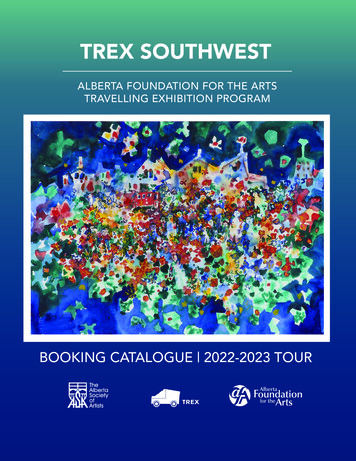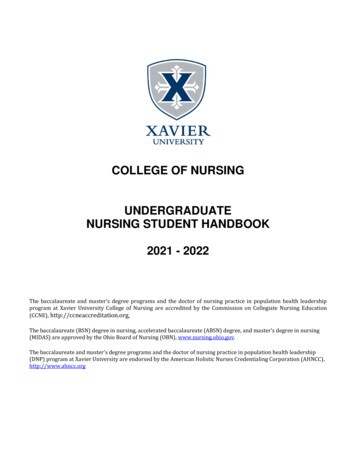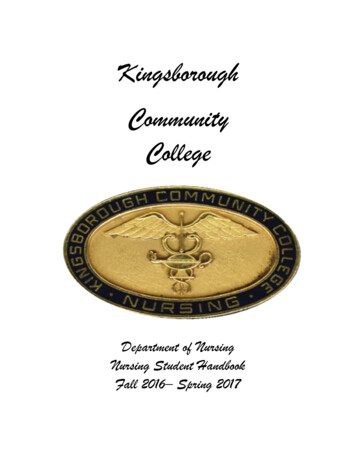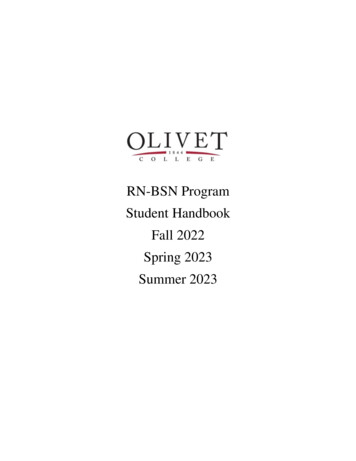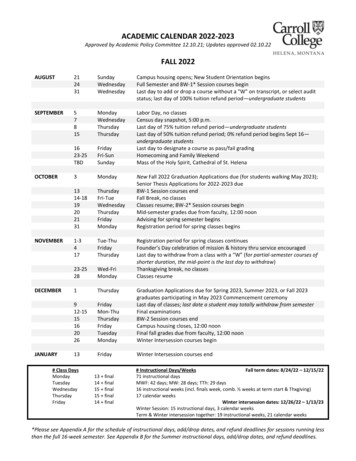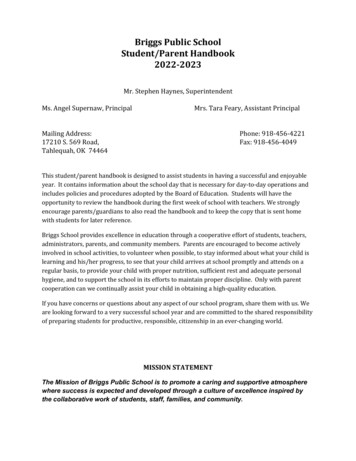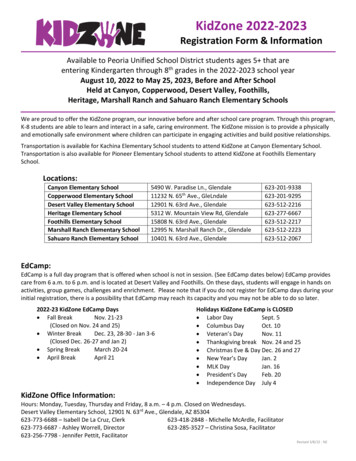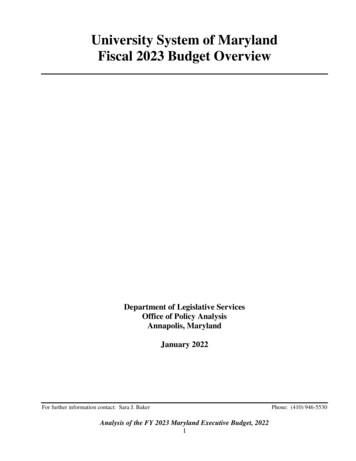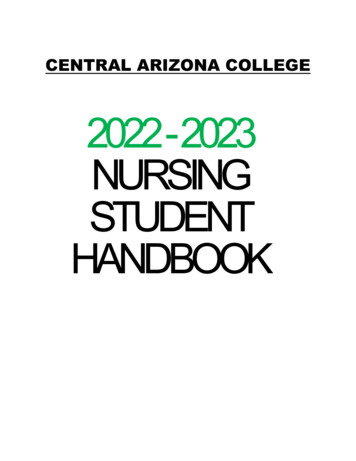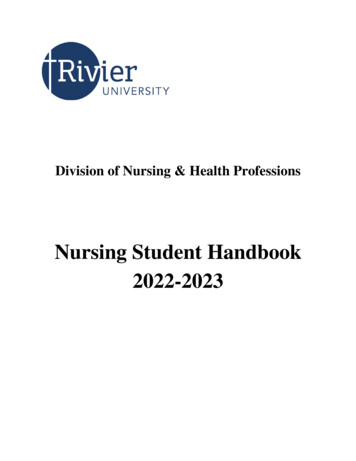
Transcription
Division of Nursing & Health ProfessionsNursing Student Handbook2022-2023
September 2022Dear Students,On behalf of the Division of Nursing and Health Professions faculty and staff, I would like towelcome you, our new and returning nursing students, to a year of new experiences andprofessional growth at Rivier University.You will see and experience many changes this fall. Our state-of-the-art Nursing Simulation andClinical Education center has officially opened. The latest technology has been mastered by thefaculty and all rooms and equipment is new! More change will be forthcoming throughout theyear. Nursing faculty are committed to guiding students’ learning and to providing challengingexperiences which will serve our graduates well as they enter the richly rewarding, dynamic andrapidly-evolving healthcare environment.Throughout the past two years, we have weathered a pandemic. Our faculty and students havebeen on the frontlines of nursing demonstrating how critical our knowledge, expertise, andpresence are to having a healthy nation.Nursing and Health Professions faculty view our students as future professional colleagues andtherefore expect students to conduct themselves in a professional manner on campus, in theclassroom regardless of learning modality and within the clinical area. We encourage nursingstudents to review the “Professionalism” guidelines in this student nurses’ handbook (p. 16).The Student Nurses Association (SNA) at Rivier University is an active student group whichoffers many opportunities for student participation in health fairs, blood drives, healthscreenings, and community outreach. These, and other activities offered through the RivierNursing Wellness Connection, will enrich your experiences here at Rivier while enhancing yourprofessional growth.I am proud to be the dean of the Division of Nursing and Health Professions at Rivier Universityand look forward to working with you as we set the direction of health for years to come.Best wishes to each and every one of you as you enjoy this academic year.Sincerely,Paula J. Williams, Ed.D., RNDeanDivision of Nursing & Health Professions
Nursing & Public Health Faculty 2022-2023Dean: Paula J. Williams, Ed.D., RNDirector, Undergraduate Nursing Education: Judi O’Hara, Ed.D., RNDirector, Graduate Nursing Education: Donna Proulx, Ph.D., RN, CCRN-CSCDirector, Doctoral Nursing Education: Donna Proulx, Ph.D., RN, CCRN-CSCDirector, Public Health Programs: Christina Griecci, Ph.D., MPHFacultyColleen Baldwin, MS, RNStephanie Ballentine, MS, APRN, FNP-BCHolly Bergeron, MS, RNTania Centra, DNP, APRN, FNP-CAshley Clement, MSN, RN-BCBeth DeRego, MSN, RNCatherine Fogg, Ph.D., APRNDeborah Gebhardt, MSN, APRN, FNP-BCTracy Hardy, DNP, MS, APRN, FNPTeresa Knight, Ed.D.(c), MSN, RNNancy Lange, MSN, PMHNP-BCJennifer Limongiello, Ph.D., FNP-BCCynthia Ludwick, APRN, PMHNP-BCSheena McAroy, MS, APRN, FNP-C, PMHNP-BCKatelyn McDonough, MS, RNErin Murphy, MSN, RN, CENSarah Phillips, MS, MPHCathy Prevost, MS, RN, PCCNHeather Schaufenbil, MSN, RNEmily Sheff, Ph.D., RN, FNP-BCCynthia Tremblay, MS, CNSAnna Wendel, Ph.D., CRNPMohammed Zaman, MS, RNMichael Zoltko, MSN, APRN, FNP-BC, PMHNP-BCFaculty EmeritusDenise Baxter, Ed.D., APRN, FNP, CNEMary Ann Breen, MS, RN, M.Ed.Grace Sullivan, DNS, APRNSenior LecturersBarbara Dunn, MS, RNJohn Foley, PharmDMark C. Hand, Ph.D., RN, CNEResource Center DirectorMelissa Bodi, BSN, RNResource Center CoordinatorHolly Mitchell, BSN, RN
Table of ContentsIntroduction .1Section 1Mission/Purpose/Philosophy . 1Organizing Framework. 3Student Learning Outcomes . 5DNHP Resource Center. 9Student Success . 9Professional Standards for Nursing . 9Ethical Behavior . 10Academic Student Participation Opportunities . 10Achievement Tests . 13Clinical Assignments. 13Clinical/Practicum Requirements . 13Penalties for Non-Compliance . 13Confidentiality Statement . 15COVID-19 Statement . 15COVID-19 Immunization Exemptions and Clinical Placements . 15CPR Certification Statement . 15Criminal Background Check . 15Drug Screening. 16Health Insurance. 16Identification Cards . 16Liability Insurance. 16Professionalism . 16Requirements for Licensure . 17Standard Precautions . 17Unit of Credit . 18Hazardous Waste . 19Weather & Emergency Closings . 20Section 2 - Undergraduate Pre-licensure PoliciesAcademic Notice . 22Attendance. 24Clinical Guidelines . 27Clinical Make-up . 29Dismissal . 30Dress Code and Personal Appearance . 31Evaluation . 33Examination . 34Leave of Absence and Illness and Procedure . 35Medication Competency. 36Notification of Change in Residence . 37NurseThink Clinical Judgment Exam. . 38Professional Comportment. . 39Progression/Retention/Graduation . 42Readmission . 44Science Grade . 46Student Signature . 47Withdrawal . 48
Section 3 - Undergraduate Post-licensure PoliciesAttendance. 50Dismissal . 51Evaluation . 52Progression/Retention/Graduation . 53Readmission . 54RN-BS Online Course Registration. 55Written Notice . 56Section 4 - Graduate Nursing PoliciesAcademic Notice Policy . 58Admissions Portfolio Policy . 59Applying for Post-Master’s Certificate Program. 60Attendance Policy . 61Grievance - Academic . 62Informed Consent . 64Notification of Change in Residence . 65Practicum Placement Policy . 66Practicum Placement: Alternative Nurse Practitioner Clinical Practicum Placement . . 68Program of Study Change . 70Progression, Retention, Dismissal Policy . 71Readmission Policy . 73Standard Precautions . 75Student Signature . 76Transfer of Credit Policy . 77Withdrawal/Leave of Absence . 78Section 5 – Doctor of Nursing Practice (DNP) PoliciesAcademic Notice Policy . 81Attendance Policy . 83Grievance - Academic . 84Maintaining Professional Licensure . 86Practicum Course Policy . 87Progression, Retention, Dismissal . 89Readmission . 90Student Scholarly Project- Scholarly Project Team . 92Transfer of Credit . 93Withdrawal or Leave of Absence . 94Student Signature Page . 96All Nursing programs are fully accredited by theAccreditation Commission for Education in Nursing, Inc. (ACEN)3390 Peachtree Road NE, Suite 1400Atlanta GA 30326(404)975-5000; www.acenursing.orgn:\Nursing Student Handbook\2022-2023
IntroductionThe Division of Nursing & Health Professions (DNHP) at Rivier University has prepared students to meet therapidly changing demands of the healthcare environment for almost three decades. Rivier University continuallybuilds on its strengths, offering programs that provide students with individual attention, a quality education, andnumerous opportunities for applying classroom theory to clinical practice. DNHP offers four undergraduate options:a part-time evening Associate of Science Degree, an LPN-ASN, a full-time, four-year Bachelor of Science Degree,and a flexible online RN-BS option for registered nurses. The program also offers graduate education in advancedclinical family and psychiatric nursing, nursing education, nursing leadership, and Doctor of Nursing Practice(DNP). Current professional standards are reflected in the learning competencies /outcomes, which move fromsimple to complex and are incremental and reinforced throughout the programs. The curriculum and instructionalprocesses reflect education and nursing theory throughout all levels of programs. Coherent organization of thecurriculum integrates general education with nursing theory and practice. Nursing education has grown throughinnovation and the DNHP emphasizes flexible high-quality programs that are the cutting edge.The Nursing Student Handbook is published annually as a reference guide for all nursing students at RivierUniversity. The information is accurate at the time of publication. The University and the Division of Nursing &Health Professions reserves the right to make necessary changes as needed with prompt notification of changes tothe students. Each student is responsible for knowing and understanding the information contained in the handbook.Adherence to guidelines is a responsibility shared by students, faculty and administrators. In addition to the policiesoutlined in this handbook, nursing students must adhere to Rivier University policies as published in the RivierUniversity Academic catalog and the Rivier University Student Handbook. Students enrolled in online coursesshould also refer to the Rivier Online Student Handbook.Purpose/MissionThe Division of Nursing & Health Professions at Rivier University, in accordance with the mission of RivierUniversity, regards as its purpose the education of individuals who seek flexibility in the educational process andcareer mobility in nursing. The Division prepares its graduates to care for all persons with respect, valuing theirpersonal worth and dignity. In pursuit of academic excellence, the Division bases its curriculum on a strongfoundation of science and liberal arts. The Division prepares its graduates for practice at the associate, baccalaureate,master’s and doctoral degree levels in nursing.PhilosophyFaculty recognize each person as a unique combination of mind, body, and soul and are committed to caring forpersons from conception through death. Caring is essential in the faculty-student relationship and in students’relationships with others throughout the program. The concept of caring permeates the curricula. Caring is viewed asa total way of being, relating, and acting (Watson, 1988). The functional and ethical manifestations of caring include“compassion, competence, confidence, conscience, commitment and comportment” (Roach, 2002), as explained in1
Table 1. Caring reflects the qualities of engagement with, and investment in, another person and is the essence ofnursing practice. Caring within the profession of nursing involves the formation of a holistic value system, thedevelopment of sound clinical judgment, and the therapeutic use of mentConscienceComportmentTable 1. Explanation of the Components of Caring (Roach, 2002)ExplanationThe ability to understand and share in people's experiences, and to exhibit a sensitivityand responsiveness to others (Roach, 2002). Compassion is discussed, modeled, nurtured,and expected throughout the curriculum. Compassion and competence are indispensableattributes of the caring nurse.The unified application of knowledge, judgment, skills, energy, experience, andmotivation required by the profession of nursing (Roach, 2002). Nursing process is themethodology used to organize nursing practice, and expertise in its application developsacross the curriculum.A quality that fosters mutual trust and respect between client and nurse (Roach, 2002). Asstudents’ knowledge and skills develop, they grow in confidence and in their ability todevelop a trusting and therapeutic nurse-client relationship.Convergence between one's desires and one's obligations, with a deliberate choice to actin accordance with the roles and responsibilities of the professional nurse in relation tooneself and others (Roach, 2002).A state of moral awareness (Roach, 2002). Conscience grows out of experience and aprocess of valuing self and others. Professional caring demands that our moral awarenessbe fine-tuned by knowledge and moral inquiry.A manner of bearing, demeanor, language, and dress that is in harmony with respect andcaring for the individual patient (Roach, 2002). It reflects self-respect and serves torepresent the profession as a whole to others.The traditional metaparadigm of nursing incorporates four key attributes: person, health, environment, and nursing.Nursing is the professionalism of the human capacity to care. Nursing is a profession that can be learned byintentional exposure to selected information, experiences, and skills, as well as the examples of faculty and othernurses. Through a therapeutic human care process, nurses assist individuals and families in attaining optimal levelsof health, comfort, and adaptation. Nursing practice incorporates knowledge, attitudes, and skills from the science ofnursing, the humanities, biological sciences, behavioral sciences and theology to provide care across the lifespanwithin the context of the nursing process. In addition, nursing is a transcultural phenomenon requiring specializedknowledge and skill to provide care that is congruent with a person’s lifestyle, social structure, and environment.A person is a unique multi-dimensional being possessing a mind, body, and soul. A person grows, develops, andlearns through interactions with the internal and external environments across the lifespan. Each person has uniquepast experiences, events, and relationships that have potential for influencing present and future behavior. Personsstrive to establish harmony within themselves and in their interactions with their environments.2
Health is a continuous, dynamic, and evolving process of adapting, coping, and growing. Health exists along acontinuum in the mind, body, and soul of a person. It is further affected by developmental processes, culture, beliefs,attitudes, choices, and lifestyles that evolve from and then are reflected in their interactions with the environment.The environment is a dynamic multi-dimensional field of continuous reciprocal interaction within which a personlives and develops. The concept of environment incorporates both internal and external forces that influenceindividuals, families, and communities. It includes subjective and objective perceptions as the person engages withopportunities and hazards for human health. Various aspects of the environment may be altered intentionally orunintentionally by human behavior.Nursing education is an aspect of higher education that seeks to share a broad base of knowledge, skills, andattitudes with students who want to learn and practice professional nursing. Through intentionally designed,outcome-oriented nursing education experiences, students’ learning occurs through active participation, discovery,modeling, dialogue, practice, and affirmation. The cultivation of personal, societal, and spiritual value systemsenhances a student’s therapeutic use of self, critical thinking, and caring potential. The pursuit of life-long learningis encouraged and supported.Organizing FrameworkThe faculty of the Division of Nursing & Health Professions believes that nursing practice is the professionalizationof the human capacity to care. The organizing framework reflects the philosophy of the faculty of the Division ofNursing & Health Professions. The curriculum is designed and organized to assist the students to attain specificlearning outcomes. Learning opportunities integrate the biological sciences, behavioral sciences, and the humanitieswith concepts of caring and nursing theory to provide a foundation for providing nursing care. The faculty utilizesan outcome-specific approach using the six competency categories for all nursing programs identified by QSEN(Quality and Safety Education for Nurses, www.qsen.org/competencies, (2012). The competency categories arepatient-centered care, teamwork and collaboration, evidence-based practice, quality improvement, safety, andinformatics.The competency categories have been used by faculty to derive end-of-program and related end-of-course studentlearning outcomes. The resulting nursing education curriculum provides the basis for description, explanation, andprediction of human needs and behavior and the foundation for incremental nursing education across the curriculum.Figure 1 illustrates the components of the nursing education curriculum beginning with the faculty’s philosophy, abroad foundation of concepts from the arts and sciences, the principles of caring, the metaparadigm of nursing,professional nursing guidelines, the QSEN competencies, and the end-of-program student learning outcomes.3
End-ofProgramStudentLearningOutcomesQSEN CompetenciesProfessional Nursing Guidelines & EvidenceBased PracticeMajor Concepts: Metaparadigm of NursingContext: CaringFoundation: Humanities, Biological Sciences, Behavioral SciencesDNHP Philosophy of Nursing Education congruent with the Mission of Rivier UniversityFigure 1. The Components of the Organizational Framework for the Nursing Education CurriculumThe ultimate goal of nursing education is to prepare the student to think critically, communicate accurately, andperform appropriate therapeutic nursing interventions in patient care situations; integrate caring behaviors withnursing actions; incorporate an ethical perspective in clinical decision making, and function effectively as a teammember within the organizational structures surrounding the delivery of safe patient-centered care.Outcomes – Undergraduate Degree in NursingThe Division of Nursing & Health Professions Program Outcomes seek to advance student knowledge regardingevidenced based professional nursing practice, encouraging students to continue to pursue advanced education,formally and informally. All DNHP Program Outcomes are based on all professional organizations listed in thishandbook on Page 8. The curriculum is designed to develop student’s knowledge and skill sets within the sixcompetencies. Current trends in healthcare are reflected within these competencies and are consistent with themission of Rivier University and the ANA Code of Ethics.The integration of the core concepts, supporting concepts, (Roche, 2002; Watson, 1988) and competencies providesthe basis for description, explanation, and prediction of human behavior and the foundation for nursing activities inthe curriculum. Caring is viewed as a total way of being, relating, and acting and reflects the qualities of engagementwith, and investment in another person, which is the very essence of nursing practice. Caring within the professionof nursing involves the formation of a holistic value system, the development of sound clinical judgment, and thetherapeutic use of self. In essence, nursing is both the professionalization and the application of the human capacityto care (Watson, 1988).4
Student Learning Outcomes – Associate of Science Degree in NursingGraduates of the Associate of Science Degree Program in Nursing are prepared to function as beginningpractitioners in structured health care agencies using established protocols. Graduates are eligible to take theNational Council Licensure Examination for Registered Nurses (NCLEX-RN) and are prepared to: Provide patient-centered, priority-based nursing care with sensitivity and respect for the diversity of thehuman experience through application of the nursing process. Demonstrate effective use of technology and standardized practices that support safe practice. Base individualized care on best current evidence, patient values, and clinical experience. Apply technology and information management tools to support processes of caring and evaluate impact onpatient outcomes. Function as a member of the healthcare team, utilizing moral, ethical, and humanistic principles. Recognize that nursing and other health professions are parts of systems of care and care processes thataffect outcomes for patients and families.Student Learning Outcomes – Bachelor of Science Degree in NursingGraduates of the Bachelor of Science Degree Program in Nursing are prepared to function as generalists whopractice professional nursing in a variety of health care settings, are prepared to pursue graduate studies, and areprepared to: Provide patient-centered, priority-based nursing care to individuals, families, and groups throughindependent and collaborative application of the nursing process. Implement factors that create a culture of safety and a just culture. Integrate evidence, clinical judgment, inter-professional perspectives, and patient preference in planning,implementing, and evaluating outcomes of care. Incorporate the use of technology that supports clinical decision making, patient education, errorprevention, and care coordination. Use inter- and intra-professional communication and collaborative skills to deliver evidence-based, patientcentered care. Participate in the use of quality indicators and core measures to evaluate the effect of change in the deliveryof care as derived through health policy.5
Student Learning Outcomes - MS Degree Program in NursingThe MS curriculum is designed to provide a foundation of philosophical, ethical and scientific knowledge whichprovides for the functional and ethical manifestations of caring, and upon which the competencies of advancedpractice rest. In addition to the nursing theorists of Watson (1988), Roach, (2002), Benner (1984), Brykczynski(1985), the educational theories of Knowles Adult Learning Theory (2005), Blooms (1956), Anderson (1995), andBoyer (1990) guide the instructional processes.The graduate faculty use Benner’s (1984) framework as modified by Brykcznski (1985) as set forth in thecurriculum guidelines published by the National Organization of Nurse Practitioner Faculties (NONPF). Thesemodifications reflect advanced nursing practice by replacing the Diagnostic and Monitoring Function andAdministering and Monitoring Therapeutic Interventions and Regimens with a single do
Accreditation Commission for Education in Nursing, Inc. (ACEN) 3390 Peachtree Road NE, Suite 1400 Atlanta GA 30326 (404)975-5000; www.acenursing.org . . The Division of Nursing & Health Professions at Rivier University, in accordance with the mission of Rivier University, regards as its purpose the education of individuals who seek .
